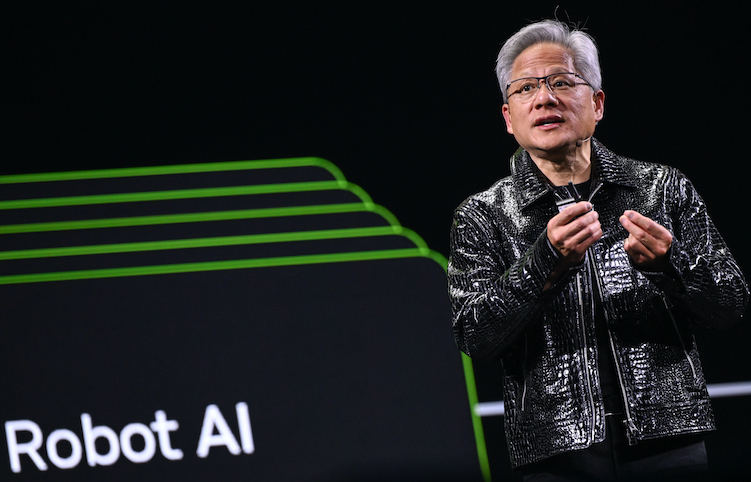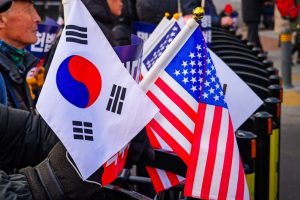The tech race between Beijing and Washington has intensified scrutiny of business dealings of some of America’s leading tech companies, as concern heightens over the risks of selling sensitive technology to China.
Early this week, the US Justice Department revealed that Cadence Design Systems had agreed to plead guilty and pay over $140 million to resolve charges that it sold chip design products to a Chinese military university believed to be involved in simulating nuclear explosions.
And on Thursday, July 31, the boot was on the other foot, with representatives of Nvidia summoned by China’s cyberspace regulator over ‘tracking’ and concerns over whether its H20 chips have a ‘backdoor’. Nvidia responded to that question hours after this report was first published with a loud NO! ‘No ‘backdoors’ on our chips.’
ALSO SEE: S Korea to Invest $450bn in US Projects, Energy; Gets 15% Tariff
More on that below. First, the case involving Cadence, one of the US’s leading electronic design automation (EDA) firms, discovered over four years ago but only resolved this week.
Cadence was accused of violating export controls by illegally selling chip design software and hardware to front companies representing China’s National University of Defence Technology.
That was a problem because NUDT’s supercomputers are thought to support nuclear explosive simulation and military simulation activities, which was why the US Commerce Department had put it on a restricted trade list in 2015 and issued notices to block shipments to the university.
Cadence, based in San Jose, California, noted a charge related to the legal proceedings in its quarterly results, which were also released on Monday.
In a filing with the US Securities and Exchange Commission, the company said it was “pleased” to reach settlements with the Justice and Commerce departments. The company’s shares rose 6.5% after it posted the news and its quarterly results, Reuters said.
The company’s settlement came as US and Chinese officials met for trade talks and debate raged about whether the Trump administration should be relaxing some of the restrictions imposed on advanced tech, such as chips used by supercomputers and artificial intelligence.
Export control violations
The problem for companies such as Cadence is the Chinese devised methods to get around Washington’s curbs. Other aliases and locations were added to the university’s listings in 2019 and 2022, including Hunan Guofeng Keji University, Central South CAD Center and CSCC.
Cadence and its subsidiary Cadence China exported electronic design automation tools at least 56 times to CSCC in the five years to 2020 when certain employees from its subsidiary Cadence China facilitated business with NUDT while knowing CSCC was an alias for the restricted university, court papers said.
They also transferred EDA tools to Phytium Technology Co, a semiconductor company closely associated with NUDT, until 2021, without obtaining required licences, according to court papers, Reuters reported on Tuesday.
So, Cadence agreed to plead guilty to one count of conspiracy to commit export control violations. It is now expected to be on probation for three years, meaning it cannot commit any further violations and has to fulfill obligations under a plea agreement.
Cadence was run for over a decade by Lip-Bu Tan, the Malaysian-born Chinese American executive who was appointed CEO of Intel in March. Tan was CEO of Cadence from 2008 till December 2021, which includes the period when the sales took place, and was executive chairman of the group till May 2023.
Entities such as NUDT are put on the restricted trade list, known as the Entity List, for activities deemed contrary to US national security or foreign policy interests. US companies are not allowed to ship goods and technology to them without licences from the Commerce Department, which are generally denied.
Electronic design automation tools are key to designing chips and verifying that they are bug-free. NUDT has developed chips to power university supercomputers, including Tianhe-2, once touted as the world’s best supercomputer, which the US believes has been used in research on or the development of explosive nuclear devices.
Some 12% of Cadence’s revenue came from China last year, down from 17% in 2023, amid heightened regulatory developments and geopolitical tensions.
China asks Nvidia to explain H20 security risks
Meanwhile, some of Cadence’s customers include major chip manufacturers such as Nvidia and Qualcomm. And on Thursday it was Nvidia’s turn, but this time it was officials in Beijing who were concerned about potential security risks posed by the US chip designer’s H20 graphics processing units.
Earlier this month, the White House reversed a ban it imposed in April and allowed Nvidia to resume sales of its H20 AI chip to China. That allowed Nvidia chief Jensen Huang to travel to Beijing with good news.
However, on Thursday, Nvidia was asked “to clarify and submit relevant supporting documentation regarding security risks, including potential vulnerabilities and backdoors, associated with its H20 computing chips sold to China,” according to a translation by CNBC of a statement issued by the Cyberspace Administration of China (CAC).
The regulator said Nvidia’s AI chips were reported to have serious security vulnerabilities. One concern was whether Nvidia’s chips have a ‘backdoor’ that would allow remote access or control, as it was worried that Chinese user data and privacy rights could be affected.
A backdoor risk refers to a hidden method of bypassing normal authentication or security controls.
Nvidia responded to that concern quickly by issuing a statement in which a company spokesperson said: “Cybersecurity is critically important to us. Nvidia does not have ‘backdoors’ in our chips that would give anyone a remote way to access or control them.”
The second worry was whether their chips have tracking or positioning functions. That concern stemmed from calls by US lawmakers recently for mandatory tracking features to be installed on advanced chips.
The (wonderfully named) CAC claimed that AI experts in the US had already revealed that Nvidia’s chips can include mature “tracking and positioning’ and ‘remote shutdown’ technologies.
In May lawmakers from both the Republican and Democrat Parties were pushing new legislation, known as the Chip Security Law, that would require chip designers and makers to include security mechanisms and location verification in advanced AI chips.
One of the key people pushing that bill was Bill Foster, a Democrat from Illinois who once worked as a particle physicist. He said the technology to track chips after they are sold is readily available, with much of it already built into Nvidia’s chips. Independent technical experts interviewed by Reuters agreed.
Nvidia made no comment about this issue and that’s probably because it is simply a proposal by lawmakers at this stage. Reuters noted that it has “not become a formal rule, and no technical requirements have been established [yet].”
Huge black market for Nvidia chips
Many lawmakers in Washington were unimpressed by Nvidia getting a green light to export its H20 chip shortly after its CEO Jensen Huang met with US President Donald Trump several weeks ago, complaining that the decision threatens US artificial intelligence “dominance” and other tech critical to military programmes.
Trump allegedly made the decision in return for China releasing rare earth exports to the US and to facilitate trade negotiations with President Xi Jinping.
But 20 former national security experts complained to Commerce Secretary Howard Lutnick that the approval for Nvidia to sell its H20 chip to China was a ‘strategic misstep’ that would blunt the country’s AI edge.
Lutnick appeared to disagree, saying Nvidia’s H20 was only the company’s “fourth best” AI chip.
Jensen Huang embarked on his visit to China, which Reuters described as a “charm offensive,” during which he sought to demonstrate his commitment to the Chinese market, met with government officials, and praised the country’s AI advances.
Tilly Zhang, an analyst with Gavekal Dragonomics, noted: “Nvidia chips are now dispensable for China. They can be easily put on the negotiating table. China obviously has more courage and domestic substitution capabilities compared to previous years to not rely on overseas technology.”
The CAC statement did not elaborate on what backdoor security risks there could be, or say what the Chinese government was considering doing as a result.
Charlie Chai, an analyst with tech- and consumer-focused 86Research, said Beijing’s warning was likely a symbolic stance against similar objections made by US authorities.
“However, we do not believe Beijing will make excessively harsh demands or introduce regulatory hurdles that will effectively drive Nvidia out of China, for the lack of alternatives. China still needs Nvidia chips for domestic research and applications,” Chai said.
Nvidia’s products are highly sought after not just by Chinese tech companies but also by Chinese military bodies, state-run AI research institutes, and universities. The company last week placed an order with contract manufacturer TSMC for 300,000 H20 chipsets due to strong demand.
On July 25 the Financial Times reported that an analysis of dozens of sales contracts, company filings and multiple sources with direct knowledge of deals found that “Nvidia’s B200 has become the most sought-after — and widely available — chip in a rampant Chinese black market for American semiconductors.”
At least $1 billion worth of Nvidia’s advanced AI chips “were shipped to China in the three months after Donald Trump tightened chip export controls,” it said, which showed the limits of Washington’s efforts to restrain Beijing’s high-tech ambitions.
Beijing reminds Nvidia it can strike back
Certainly, there is a huge market for Nvidia chips in China. But whether that continues may depend on its response to the CAC inquiry and how Beijing decides to proceed.
Chinese authorities and industry associations have in the past accused US tech companies of posing security risks, with varying consequences.
In early 2023, China barred key operators of the country’s infrastructure from purchasing from Micron, saying that a review it conducted had found the US memory chipmaker’s products posed serious security risks.
And last year, the Cybersecurity Association of China, an industry group, called for Intel products sold in China to be subject to a security review, but Chinese regulators have not publicly responded.
Nvidia is also facing an antitrust investigation in China. The State Administration for Market Regulation announced late last year it was investigating the chipmaker over alleged violations of the country’s anti-monopoly law.
The regulator said Nvidia was also suspected of violating commitments it made during its acquisition of Israeli chip designer Mellanox Technologies, under terms outlined in the regulator’s 2020 conditional approval of that deal.
President Xi Jinping has made it clear that China will do all it can to avoid reliance on foreign products. Beijing’s ultimate goal is domination of the chip sector and that means Nvidia’s time in the sun is limited to the benefits it can provide to China.
The path ahead is unlikely to be smooth.
- Jim Pollard with Reuters
NOTE: This report was updated on August 1, 2025 to include Nvidia’s response to the CAC probe.
ALSO SEE:
Chinese AI Firms, Chipmakers Form Alliance To Ditch Foreign Tech
Is the AI frenzy a hallucinatory bubble?
Nvidia CEO Says US Export Curbs on AI Chips is ‘Flawed’ Policy
China’s Xi Issues Rare Warning on Over-Investment in EVs, AI – FT
China Softens Tone on US Ties Amid Potential Thaw In Chip War
TSMC Sees 60% Profit Jump on AI Chip Demand, But Fears Tariffs
China Scrambles for Nvidia’s H20 Chips as Trump ‘Reverses’ Curbs
Nvidia’s Huang Says China’s Military ‘Can’t Rely on US Tech’
US Lawmakers Push Location-Tracking For High Powered AI Chips
Server Fraud Case in Singapore May be Linked to AI Chips, China
























